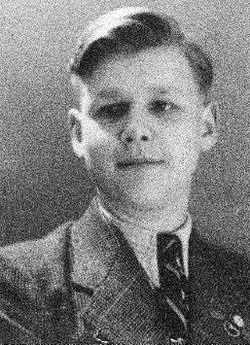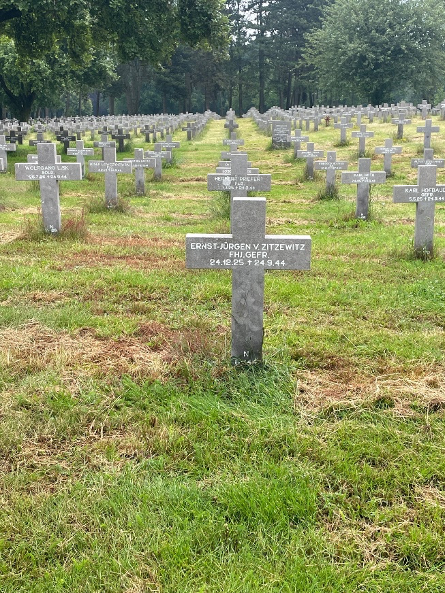
Klara von Zitzewitz was 90 years old when she last visited the grave of her son Ernst-Jürgen. After a long search, his family only heard of his grave at the German Military Cemetery in Ysselsteyn in 1951. Since then, his mother has regularly visited his grave and in 1952 came up with the idea of placing a carillon at the cemetery. She herself financed the largest bell of the carillon, but other relatives, the city of Berlin and the German Ministry of Foreign Affairs also contributed to the carillon. In 1960 the carillon consisted of 25 bells and was installed in the cemetery. The bells contain the names of the soldiers whose relatives have made a donation. The carillon was initially located near Ernst-Jürgen's grave, but was moved in 1990 to where the carillon still stands today. In 1974 the carillon was damaged by a lightning strike and had to be extensively repaired. The carillon then took its current form and plays a melody every half hour every day, between 9 a.m. and 5 p.m.
„Unserem lieben eeninzigen Sohn
Ernst-Jürgen von Zitzewitz
Born on the 24th of December 1925 in Berlin
Born on the 24th of September 1944 in Veghel
Zum Gedächtnis gewidmet von seinen Eltern
Und seiner Omi from Berlin.
If you are happy, that my Lord
a stranger to my comrades
, so will I
live in the crown of life.”
“For our beloved only son
Ernst-Jürgen von Zitzewitz
Born on December 24, 1925 in Berlin
Killed in action on September 24, 1944 near Veghel
Dedicated to his memory by his parents
And his grandmother from Berlin
We also greet you, the army of his
Unknown fallen comrades
Be faithful unto death, and I will
give you the crown of life.”


Opposite the grave of Ernst-Jürgen von Zitzewitz, a bench has been placed where Klara commemorated her son. She sometimes sat for days at a time in this spot, which can still be found in the cemetery.
Ernst-Jürgen von Zitzewitz was born on December 24, 1925 in Berlin as a member of the noble Von Zitzewitz family. In the Second World War he opted for an officer career and fought in the training battalion 453-2/Ausb in 1944. Btl. OA as aspirant with the title “Fahnenjunker-Gefreiter” He was sent to the Dutch front during Operation Market Garden where he died in the fighting near Veghel on September 24, 1944. He was initially buried in Son, but was reburied in Ysselsteyn in 1946. After his battle at the front, his parents never heard from him again. After the end of the war, Klara searched for answers to questions about her son's fate. Unfortunately, this search was in vain. In 1951 it became clear from the Red Cross that her son had died in the Netherlands during the war. Her search came to an end when Klara was told what had happened to her son and she found his grave in Ysselsteyn.







